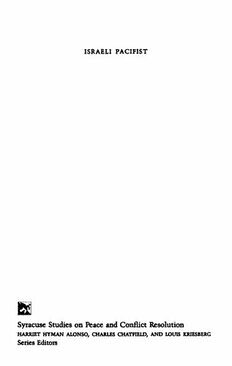
Israeli Pacifist: The Life of Joseph Abileah PDF
Preview Israeli Pacifist: The Life of Joseph Abileah
ISRAELI PACIFIST 3 a Syracuse Studies on Peace and Conflict Resolution HARRIET HYMAN ALONSO, CHARLES CHATFIELD, AND LOUIS KRIESBERG Series Editors Joseph Abileah in his study. I sr a e l i P a c if is t THE LIFE OF JOSEPH ABILEAH Anthony G. Bing Foreword by Yehudi Menuhin sly SYRACUSE UNIVERSITY PRESS Copyright © 1990 fay Syracuse University Press Syracuse, New York 13244-5160 All Rights Reserved First Edition 1990 99 98 97 96 95 94 93 92 91 90 6 5 4 3 2 1 Except where otherwise noted, photographs are from the collection of Joseph Abileah. The paper used in this publication meets the minimum requirements of Ameri can National Standard for Information Sciences—Permanence of Paper for Printed Library Materials, ANSI Z39.48-1984. @T library of Congress Cataloging-in-Publication Data Bing, Anthony G., 1935- Israeli pacifist : the life of Joseph Abileah / Anthony G. Bing, p. cm. ISBN 0-8156-2488-3 (alk. paper) 1. Abileah, Joseph. 2. Pacifists—Israel—Haifa—Biography. 3. Jewish-Arab relations. 4. Violinists—Israel—Haifa—Biography. 5. Haifa (Israel)—Biography. I. Title. JX1962.A35B56 1990 327.1T092—dc20 [B| 89-78278 CIP Manufactured in the United States of America Contents Illustrations vii Foreword ix Acknowledgments xi 1. Introduction 1 2. A Return to the Roots, 1915-1936 5 3. Not in the Joshua Way, 1936-1947 27 4. Fanatic for Truth, 1947-1950 49 5. A Task Worthy of Jews, 1950-1967 89 6. Isaiah's Tfeaching, 1967-1972 123 7. Society for Middle East Confederation, 1972-1987 153 8. The Thie Victories 193 Illustrations Joseph William Abileah frontispiece Ephraim Abileah 7 Miriam Abileah 7 Joseph (Willi) Abileah and Avshalom (Rudi) Abileah 12 Abileah music business 15 Walking tour of the Dead Sea 20 Joseph Abileah and Dinah Yarmus Abileah 38 The paralytic of Mount Carmel 44 Altered identity card 48 International work camp in Israel 105 Abileah scooter 111 Lecture tour 136 Conversation with a Palestinian 144 Joseph and the occupation 145 Joseph and Dinah 189 Joseph Abileah 191 Vil Anthony G. Bing has spent considerable periods of time liv ing and working in the Middle East for the past twenty years. He has set up academic programs in Lebanon and Israel. An active member of the Society of Friends, he has worked with the American Friends Service Committee and other Quaker organizations and serves on the executive committee of the Peace Studies Association. Professor of English and Director of Peace Studies at Earlham College, he is currently working on a book concerning the role of the Middle East and the Ameri can peace movement. Foreword *$j| As one who has repeatedly nominated Joseph Abileah, mu sician of Haifa, for various peace awards, I am particularly grate ful to Professor Anthony Bing for having singled out this unique, committed character. Professor Bing's timely biography conveys the very ancient struggle between the real and practical im perative of moral conduct—as deeply understanding of others as it is determined in its fierce espousal of truth—and the mi rage of worldly power and materialistic ambition that have caused maris overwhelming urge to dominate and humiliate distinguishable and competitive brethren. It is a deadly and tragic struggle that has marked for thou sands of years the rich history of the Holy Land. Although this severe and obstinate land has seen the emergence of monothe istic faith from the pluralistic pagan idols and gods, ironically the acceptance of the one binding universal truth by different tribes has led to the renewed betrayal in human hands of the one to the many. Each tribe has seized on the exclusive nature of its own unitary truth and has become intransigent in its op position to the truths of others. This intransigence argues that the "one and only truth* cannot be whole unless all believers are unanimous. Ibday we witness the intolerable consequences; a war be tween peoples, religions, and states played out on a very small strategic and hallowed site—the "Holy Land*—and carrying dis astrous, worldwide implications. Joseph Abileah stands modest and unassuming in a long and revered tradition of spiritual Zionism, as opposed to the na tional and political Zionism of Israel today, as every reader can learn from Professor Bing's admirable and sensitive book. He ix X FOREWORD is a frail figure, unarmed and vulnerable, yet spiritually and in tellectually strong, standing, as already quite a number of our coreligionists have stood, against tanks, poison gas, and gas ovens. Can the example of men and women like Joseph Abileah confront and transform the violent forces at work in our world? Though I cannot answer that question, I am humbly content to be a colleague of Joseph Abileah, a fellow violinist. Yehudi Menuhin
